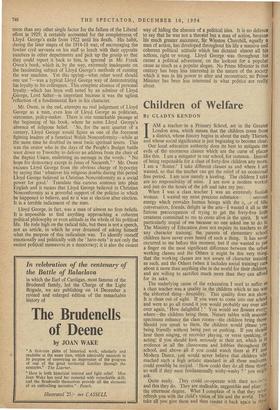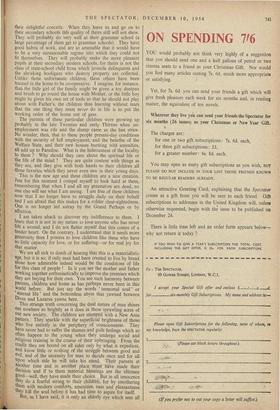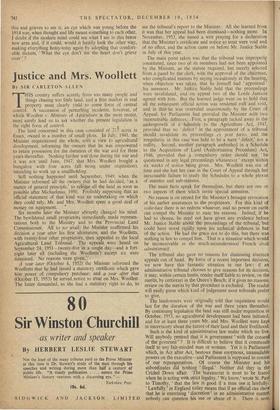Children of Welfare By GLADYS KENDON I AM a teacher 'in
a Primary School, set in the Greater London area, which means that the children come froro a district, whose history begins in about the early Thirties, and whose social significance is just beginning to become clear. Our local education authority does its best to mitigate the evils of the enormous classes which are the curse of places like this. I am a mitigator in our school, for instance. Instead of being responsible for a class of forty-five children any more, I am a 'floater.' I take different classes as and where I am wanted, so that the teacher can get the relief of an occasional free period. I am now merely a hireling. The children I take are no responsibility of mine. I am now a modern worker and just do the hours of the job and take my pay. When I was a class teacher I was an extremely foolish woman. I wasted my most precious substance– '. nervouS energy which provides human beings with the s, ...c of life, conversation, friends, delight in the arts—I wasted it all in the furious preoccupation of trying to get the forty-five little creatures committed to me to come alive in the spirit. It was particularly stupid of me because no one asked me to do it. The Ministry of Education Aoes not require its teachers to do any character training; the parents of elementary school children have never even heard of such a thing. It has never occurred to me before this moment, but if one -wanted to put a finger on the most significant difference between the urban working classes and the Others it might be this very thing, that the working classes are not aware of character training as such, and the Others (when it includes social training) care about it more than anything else in the world for their children, and are willing to sacrifice much more than they can afford for its sake.
The underlying cause of the exhaustion I used to suffer as a class teacher was a quality in the children which to me vvas the abhorred thing—Insipidity. This quality does not shoW. It is clean out of sight. If you were to come into our school and were to go all round it you would probably say over and over again, 'How delightful ! ' You would see flowers everr, where—the children bring them. Nature tables with seasonal specimens enhance the class rooms—the children bring those. Should you speak to them, the children would please you: being friendly without being pert or pushing. If you should hear them singing, or recorder playing, or verse speaking, dr acting; if you should look seriously at their art, which is id evidence in all the classrooms and lobbies throughout the, school, and above all if you could watch them at PT and Modern Dance, you would never believe that children wit° reached such a high artistic standard in all these mediums' could possibly be insipid. 'How could they do all these thinly's, so well if they were fundamentally wishy-washy ? ' you mig:11 ask.
Quite easily. They could co-operate with their tea..lir': and this they do. They are malleable, suggestible and !Alan' the uttermost degree. What I complain of is that they lie, ct refresh you with the child's vision of life and the world. TO take all you give them and then render it back again in Ili'e their delightful conceits. When they leave us and go on to their secondary schools thts quality of theirs still will not show. They will probably do very well at their grammar school (a large percentage of them get to grammar schools). They have good habits of work, and are so amenable that it would have to be a very unreasonable regime into which they could not fit themselves. They will probably make the more pleasant pupils at their secondary modern schools, for theirs is not the class of state-school child from which juvenile delinquents and the shrieking hooligans who destroy property are collected. Unlike those unfortunate children, these others have been trained in the home to be co-operative. I imagine, for instance, that. the little girl of the family might be given a toy dustpan and brush to go round the house with Mother, or the little boy might be given his own set of tools so that he should not play about with Father's, the children thus learning without tears that the one thing they must never do in life is to put the Working order of the home out of gear. The parents of these particular children were growing up probably in the late Twenties and early Thirties when un- employment was rife and the slump came as the last straw. No wonder, then, that to these people present-day conditions With the security of full employment, and the benefits of the Welfare State, and their new houses bursting with amenities, all add up to Paradise. What is the hideousness of the locality to them ? Why should they care about the spiritual life or the life of the mind ? They are quite content with things as they are, and they give with both hands to their children ,all those luxuries which they never even saw in their young days. This is the new age and these children are a new creation. Just for this moment I compel myself to look hard at them, remembering that when I and all my generation are dead, no one else will see what I am seeing. I am free of these children now that I no longer have to struggle daily on their behalf and I am afraid that this makes for a colder clear-sightedness. One is no longer led astray by the Grand Perhaps or by affection.
I am taken aback to discover my indifference to them. I learn that it is not in my nature to love anyone who has never felt a wound, and I do not flatter myself that this comes of a tender heart. On the contrary, I understand that it needs more generosity than I possess to love children like these who have so little capacity for love, or for suffering—or for real joy for that matter.
We are all sick to death of hearing that this is a materialistic age, but it is so; if only man had been created to live by bread alone how admirable indeed would be the conditions of life for this class of people ! In it you see the mother and father Working together enthusiastically to improve the premises which they are buying for their own. You see such harmony between parents, children and home as has perhaps never been in this world before. But just say the words 'immortal soul' or eternal life' and the bottomless abyss that yawned between Dives and Lazarus yawns here. This strange truth concerning the dual nature of man shines out nowhere so brightly as it does in these sprawling acres of our new society. The children are stamped with a New Area Pattern. They sparkle with the superficial brightness of those Who live entirely in the periphery of consciousness. They have never had to suffer the shames and guilt feelings which so Often happen to the young when they undergo social and religious training in the course of their upbringing. From the cradle they are bound on all sides only by what is expedient, and know little or nothing of the struggle between good and evil, and of the necessity for man to decide once and for all Upon which side he will take his stand. Their parents at another time and in another place must have made their decision and if to them material blessings are the ultimate good—well, they have made their choice. But in all innocence they do a fearful wrong to their children, for by smothering them with modem comforts, amenities, ease and pleasantness they kill the soul before it has had time to aspire for itself. But, as I have said, it is only an elderly eye which sees all this and grieves to see it; an eye which was young before the 1914 war, when thought and life meant something to each other. 1 doubt if the modern mind could see what I see in this brave new area and, if it could, would, it hastily look the other way, making ciierything hotsy-totsy again by 'adopting that comfort- able dictum. What the eye don't see the heart don't grieve over ' ?










































 Previous page
Previous page